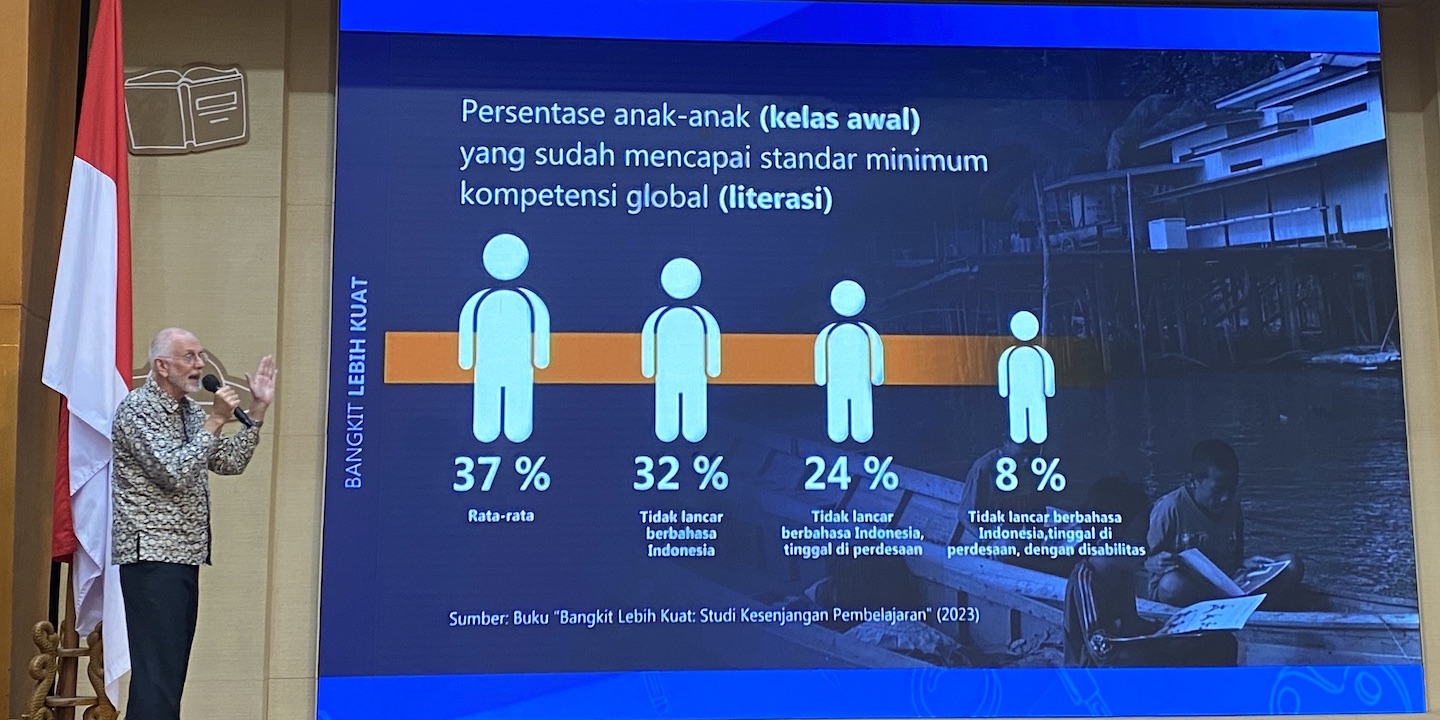
Influencing policy through research in Indonesia
Research 13 Nov 2023 4 minute readA new book based on an ACER study conducted in Indonesia during COVID-19 was recently released.
‘Bangkit lebih Kuat: Studi Kesenjangan Pembelajaran’ (Bounce Back Stronger: A Study of Learning Gaps), was published in Bahasa Indonesia by the Australian Government’s Department of Foreign Affairs and Trade (DFAT) through the Innovation for Indonesia’s School Children Australia Indonesia Partnership (INOVASI). The Centre of Standard and Educational Policy (Pusat Standar dan Kebijakan Pendidikan or PSKP) of the Indonesia Ministry of Education, Culture, Research, and Technology (MoECRT) launched the book at a special event in Jakarta. Invited guests included stakeholders from education and development sectors and leading Indonesian media outlets.
The book is based on research conducted by ACER in 2020. The study included students in Grades 1-3 from 19 sub-districts in 8 provinces.
The study assessed potential gaps in student learning in Indonesia that could help the MoECRT to better understand the standards set for students and actual student attainment. It also identified the level of basic literacy and numeracy mastery of students in Indonesia and the impact of the COVID-19 pandemic.
The study found that learning gaps were magnified for marginalised students, such as those lacking access to preschool, living in remote areas, with physical disabilities, and those with limited or no access to internet or computers. Recommendations included investing in underserved areas, engaging with communities and families, identifying the more marginalised students within schools to engage in innovative programs, and a more targeted system of support.
Nadiem Makarim, Indonesian Minister for Education, Culture, Research, and Technology attended the book launch and led discussions with teacher representative Staccia Alessandra, from the Nagekeo district, East Nusa Tenggara, and the governor of the Bulungan province, North Kalimantan, Syarwani. These panelists from remote districts of Indonesia shared lessons learned on how to target learning and that an individualised approach could be key to helping students attain progress in their learning, particularly the marginalised students described in the study.
Minister Makarim encouraged participants to use the lessons from the pandemic to accelerate education. He recommended giving freedom to education stakeholders to decide the model of learning most suitable for the character of each student.
The launch event was attended by the Vice Ambassador of Australia to Indonesia, Stephen Scott. In his remarks, Mr Scott mentioned how the quality of education and skills that we foster into our children is key to realising the country’s development trajectory. The government needs to implement education strategies to achieve all of the other goals and aspirations for its people. ’It is true in Australia and it is true in Indonesia, so we’ve always invested heavily in the development area in the region,’ expressed Mr Scott.
The Head of the Agency for Standardization, Curriculum, and Assessment in Education, MoECRT, Anindito Aditomo praised the study for enriching knowledge and its relevance for the MoECRT to use as the foundation for its policymaking process on educational transformation.
‘The book described an extraordinary study, because it provides student’s learning journey from before and after the pandemic, said Mr Aditimo. ‘This is one of a few longitudinal studies on how the pandemic affected learning and the most effective recovery efforts we should focus on.’
INOVASI partners with national and sub-national governments, schools and also with non-government organisations and the private sector. Examples of the program’s assistance include: expert technical advice, continuous policy engagement, support for the Government of Indonesia to pilot new approaches, responsive research, knowledge-sharing and partnership brokering. The ACER study is important for progressing the learning of all children in Indonesia and helping to shape education policy.
Read the series of learning gap publications: https://www.inovasi.or.id/en/publikasi/the-learning-gap-series/
Watch the project summary video:
Watch the event video: